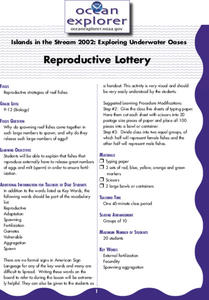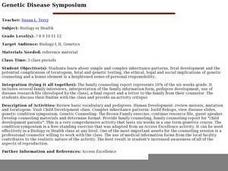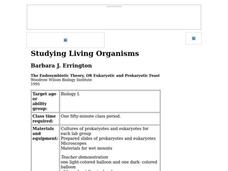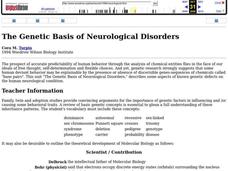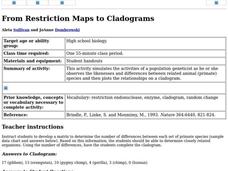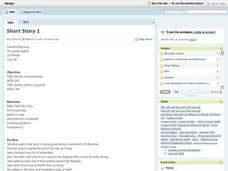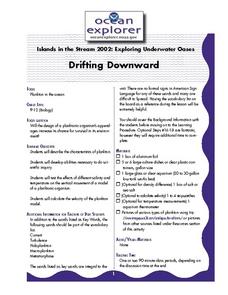Curated OER
Hardy-Weinberg Equilibrium According to Hoyle:
Learners gain a feeling for the significance of the Hardy-Weinberg Equilibrium without using algebra but participating in an interactice game.
Curated OER
Individualism
Students demonstrate knowledge of the understanding of American individualism, specifically four areas: decision making, expressing opinions, competition, and obligation.
Curated OER
Hardy-Weinberg Equilibrium According to Hoyle: OR, Population Genetics or Platypapyrus foursuitii
Students use this exercise to help achieve a working knowledge of the Hardy-Weinberg Equilibrium without recourse to algebra. After participating in this activity, students gain a feeling for the significance of the Hardy-Weinberg...
Curated OER
From the Gulf of Mexico to the Moons of Jupiter
Students compare deep ocean conditions to those found on the moons of Jupiter. In this Earth science lesson, students consider the possibilities and conditions needed to support simple life. Students examine the habitats and life found...
Curated OER
Seals, Corals, and Dollars...
Learners explore the interdependence of animals and their habitat. In this Hawaiian ecology lesson, students work in groups to research the necessity of preserving precious coral as a habitat for monk seals. Learners prepare and share...
Curated OER
Reproductive Lottery
Young scholars explain that fishes that reproduce externally have to release great numbers of eggs and milt (sperm) in order to ensure fertilization.
Curated OER
Genetic Disease Symposium
Students research simple and complex inheritance patterns, fetal development and the potential complications of teratogens, fetal and genetic testing, and the ethical, legal, and social implications of genetic counseling.
Curated OER
Culture Everywhere
Students study their culture while filling in a chart that shows how culture meets basic human needs. They examine the role of archaeologists in studying people from past cultures.
Curated OER
Studying Living Organisms
Students are introduced to Hardy-Weinberg Equilibrium without recourse to algebra. After participating in this activity, students gain a feeling for the significance of the Hardy-Weinberg Equilibrium without using algebra.
Curated OER
Fish Parasite Survey
Students count nematodes, cestodes and crustaceans on approximately one-hundred and fifty fish. They fill out autopsy reports for external and internal parasites then complete and discuss guide questions to make inferences about parasite...
Curated OER
Studying Species By Examining the Evolution of the Canidae Family
Students read an article on the characteristics of wolves and dogs then complete a phylogenetic tree of the canid family. They then write an essay justifying why or why not wolves and dogs should be classified as different species.
Curated OER
Time Conceptualization
Students relate the number and length of generations in their living family members to the number of generations that have passed since specific events in recorded history. They then apply this time conceptualization to the number of...
Curated OER
Fish Parasite Survey
Students survey and dissect as many fish as possible. They count nematodes, cestodes and crustaceans on the fish, fill out autopsy reports, and transfer data to a chalkboard data table. Students graph the results of the entire class...
Curated OER
The Genetic Basis of Neurological Disorders
Pupils explore neurological disorders. They examine the presence and absence of discernible genes. Students describe neruological diseases and draw faces of affected persons. They play a human neurology disorders learning game.
Curated OER
Fragments
For this sentence correction worksheet, students read the sentences for each example. Students find the fragment and circle it.
Curated OER
Observing Osmosis in a Chicken Egg
Tenth graders develop a hypothesis and explain what they observed on an activity. In this investigative lesson students observe osmosis and report their data using a graph.
Curated OER
Reef Fish Real Estate in the South Atlantic Bight
Students research a species of reef fish to determine its habitat requirements as both a juvenile and an adult. They use this information to create a pamphlet in the style of a real estate brochure that describe the habitat and food...
Curated OER
Radiation
Students distinguish between natural and man-made radiation. They measure radiation using a Geiger counter and investigate footprints of radiation.
Curated OER
Land Use Issues
Students observe and describe the properties of rocks and their significance relationship in the environment. They explain the implications of destroying habitats and the importance of rebuilding them.
Curated OER
From Restriction Maps to Cladograms
Students develop a matrix to determine the number of differences between each set of primate species. They determine closely related organisms then complete the cladogram and answer a set of questions.
Curated OER
California Biodiversity
Students examine several maps of California exhibiting features such as precipitation, topography, and vegetation. They look for patterns that might be the source of or influence biodiversity in different regions. They pay particular...
Curated OER
Short Story
Seventh graders identify the various elements of a short story. After reading Rudyard Kipling's short story, "Rikki-Tikki-Tavi," students identify the author's purpose in writing the story as well as the elements that make it a short...
Curated OER
Drifting Downward
High schoolers study the effects of different salients and temperatures on vertical movement of an organism. In this experimental instructional activity students design different shapes of foil to simulate drifting planktonic organisms.
Curated OER
Saving Humpty Dumpty;Recycling, Environmental Science, Math, Ecology, Athletic Shoes
Learners describe how shoe design, manufacturing, retailing, consumer use, and disposal impact environments and societies. They discuss ways to reduce, reuse, or recycle resources in the life-cycle for a shoe product.
Other popular searches
- Plant Biology Vocabulary
- Biology Vocabulary Words
- Ap Biology Vocabulary
- Biology Vocabulary Genetics
- Biology Vocabulary Review
- Biology Vocabulary Lessons
- Biology Vocabulary 98
- Biology Vocabulary Prefixes
- Biology Vocabulary Bacteria
- Biology Vocabularyv 98







